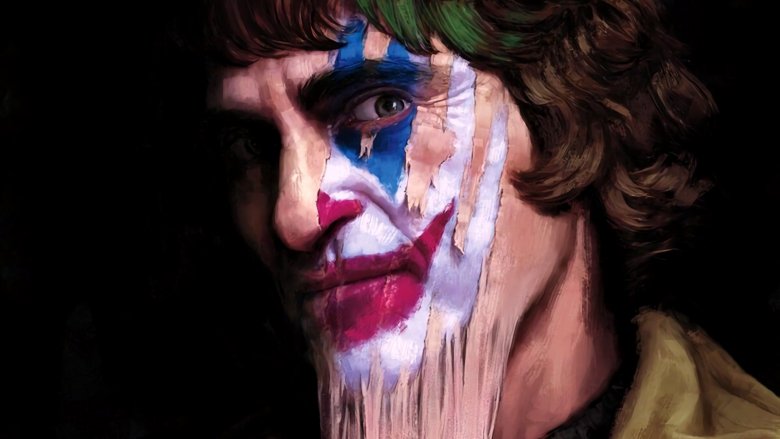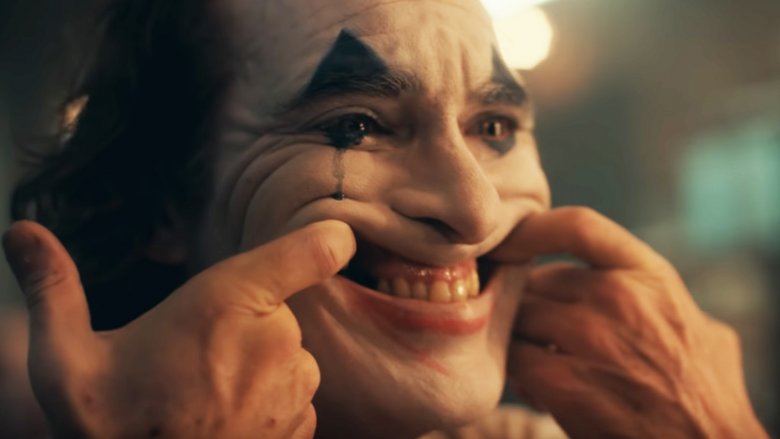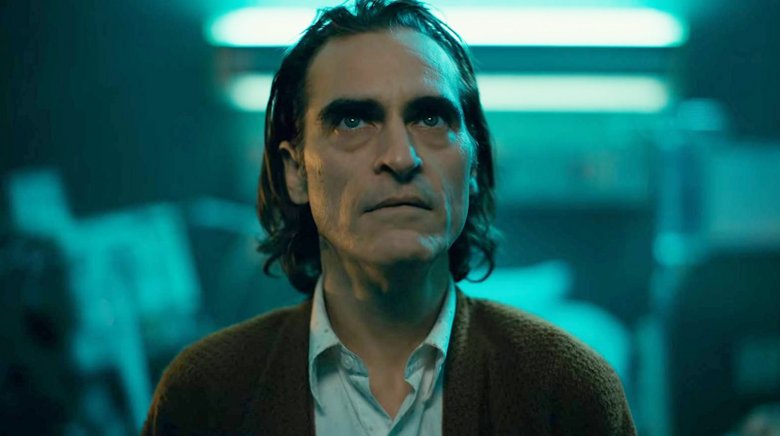Why Joaquin Phoenix Walked Out Of A Joker Interview
Joaquin Phoenix may play a man with an uncontrollable cackle in director Todd Phillips' Joker, but he certainly wasn't laughing in an interview about the dark and gritty comic book movie.
Phoenix, who stars as failed comedian Arthur Fleck in the Joker origin story film releasing on October 4, sat down for an interview with The Telegraph's Robbie Collin. At some point during their conversation, which we assume was going swimmingly at the start, Phoenix got up and walked out. But why, exactly?
Well, the topic of discussion shifted to a place Phoenix's mind hadn't yet been, taking him by surprise and causing him to exit the interview.
Collin had asked Phoenix a question he was ostensibly unprepared for: had he ever considered whether his version of the Joker — a man rejected by society and distraught over his failed career, with deep-rooted troubles that eventually manifest into extreme violence — would motivate a viewer (or worse, viewers) to follow in his footsteps? Might someone who sees Joker in theaters be inspired by Arthur Fleck's descent into madness and rise into terrifying power when he becomes the murderous Joker, viewing the film not as a cautionary tale but as a story to which outcasts can relate? Phoenix certainly didn't know how to respond.
Collin described the moment his interview with Phoenix took this unexpected turn: "Unlike Heath Ledger's inscrutable take on the character in 2008's The Dark Knight, Phoenix's Arthur Fleck, a failed comedian who still lives with his elderly mother, is the horribly familiar enemy within. If the film hadn't been set in the '80s he could easily be the latest online message-board extremist to take his grievances murderously viral. Yet Phoenix doesn't seem to have considered this kind of question at all. So when I put it to him — aren't you worried that this film might perversely end up inspiring exactly the kind of people it's about, with potentially tragic results? — his fight-or-flight response kicks in."
Phoenix is said to have given Collin the same kind of "thin-eyed glare" he displayed in films like The Master and You Were Never Really Here before curling his lip up and asking, "Why? Why would you? No... no." According to Collin, Phoenix then stood up, shuffled toward him, shook his hand, and left.
Roughly an hour later — largely spent talking with Warner Bros.' PR team — Phoenix was back in front of Collin to continue the interview. The actor explained that he "panicked" because "the question genuinely hadn't crossed his mind before," and asked Collin what might be an "intelligent answer" to the inquiry.
Though Collin and Phoenix did keep chatting about Joker after the actor returned, discussing how Phoenix trained with a movement coach to perfect Arthur's post-murder dances as well as how he viewed Joker's laugh as "a neurological tic," Phoenix never did answer Collin's original question – nor did Collin provide an example of what a carefully-worded response to the question would sound like.
Critics have been questioning potential consequences of Joker's Arthur Fleck
The question of whether Joker might spur someone — or several people, even — to do exactly what Arthur Fleck does when he hits his rock bottom may have caught Phoenix off-guard, but it's one that has come up numerous times amongst critics.
After Joker made its worldwide debut at the Venice International Film Festival on August 31, 2019, critics rushed to get their reviews up and out to the public. The vast majority of reviewers gave high praise to the pic, exalting Phoenix's performance as the failed-comedian-turned-killer as Oscar-worthy and applauding the narrative as powerful enough to revolutionize the comic book movie genre. However, there was a commonality amongst many more critical reviews of Joker: that Arthur Fleck may send a dangerous message and give viewers the wrong idea about avenging their own personal grievances.
Vanity Fair critic Richard Lawson wondered in his review of Joker whether the film "may be irresponsible propaganda for the very men it pathologizes."
Stephanie Zacharek at Time felt that Arthur Fleck comes across uncomfortably similar to some of the most violent, dangerous people who have inflicted incredible harm to people, particularly in America. She wrote in part, "All of Arthur's travails are leading up to a series of 'See what you made me do?' brutalities, most of which happen while he's dressed up in his clown suit. Violence makes him feel more in control, less pathetic. Killing [...] empowers him [...] The movie lionizes and glamorizes Arthur even as it shakes its head, faux-sorrowfully, over his violent behavior."
Collin himself tweeted after watching Joker at the Venice Film Festival that he thinks the movie is good, but he's "worried someone's going to get killed" because of it. He stated in his full review, published on The Telegraph, "This is a film that is going to stir up trouble — in the consciences of everyone who watches it, and almost certainly in the outside world as well."
Others are defending Joker's violence
On the flip side, some feel that wariness toward Joker is unwarranted. The Outline's Alex Nichols argued that the idea of Joker's violence potentially resulting in real-life tragedies "rests entirely on the assumption that violent media breeds violent behavior." Stephen Galloway of The Hollywood Reporter also stands behind Joker's "repulsive violence," writing that there has been no study published with "evidence to show that a criminal — even one who imitates something on film — wouldn't have done something equally abominable at another time." He also argued that Joker doesn't celebrate violence, but "sickens us, nauseates us, repulses us at our very core," and that the only kind of person the film would inspire to commit acts of violence is someone who "doesn't need Joker to tip him into action."
All sides considered, it seems there's no clear-cut, simple, or, as Phoenix said in his interview, "intelligent" answer to the question at hand. Joker director Phillips maintains that it all "depends on the lens on which you view [Joker] through," while Phoenix has said that however someone wants to talk about the film is up to them. It seems this type of complexity and ambiguity may have been one of the biggest reasons why Phoenix signed on for Joker in the first place. As the actor told Collin after coming back for the interview, he liked that Arthur Fleck as a character "pos[ed] questions with no easy answers."
Decide how you feel about Joker when the film opens in theaters on October 4.


